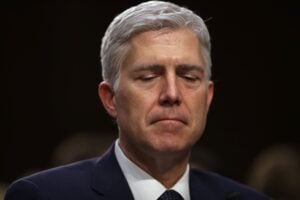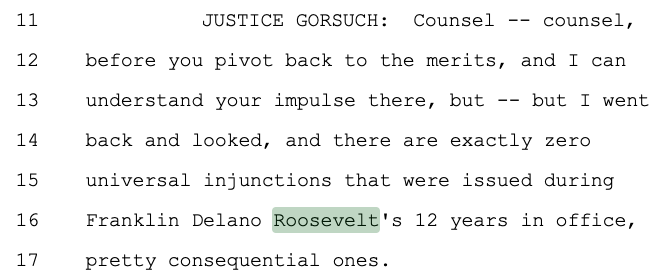[ad_1]
 Conservative judges might be up in arms over efforts to curb right-wing forum shopping, but conservative justices don’t seem as keen on handing the keys to constitutional order over to random judges in isolated courthouses. At the oral argument over the nationwide mifepristone injunction — arguably the decision most responsible for the forum shopping reforms — the justices expressed skepticism that district judges should even have the power to issue the sort of sweeping remedies that made this brand of forum shopping so powerful.
Conservative judges might be up in arms over efforts to curb right-wing forum shopping, but conservative justices don’t seem as keen on handing the keys to constitutional order over to random judges in isolated courthouses. At the oral argument over the nationwide mifepristone injunction — arguably the decision most responsible for the forum shopping reforms — the justices expressed skepticism that district judges should even have the power to issue the sort of sweeping remedies that made this brand of forum shopping so powerful.
“This case seems like a prime example of turning what could be a small lawsuit into a nationwide legislative assembly on an FDA rule or any other federal government action,” Gorsuch noted to Erin Hawley, the representative of hate group Alliance Defending Freedom arguing the case.

Except by, “I went back and looked,” he means he did not go back and look and by “exactly zero” he means not zero.
Law professor Ezra Ishmael Young flagged a law review article they’d written debunking the “novelty critique” that conservatives level against injunctions.
An early representative example is the 1939 nationwide injunction issued in Lukens Steel Co. v. Perkins. There, the D.C. Circuit reasoned that federal courts have the power to enjoin a federal official and agency from engaging in certain purchasing activities with respect to iron and steel industries and ultimately deemed it of no moment that there was no legislation expressly authorizing such an injunction.
This, of course, places the injunction squarely in the Roosevelt administration.
But these are the knots you tie yourself in if you’re unwilling to call out the Federalist Society mission to empower life-tenured ideologues. The problem isn’t really that district courts can issue equitable relief that’s national in scope, but that cynical actors can forum shop for judges willing to abuse that power.
Pinning blame on injunctions per se doesn’t even make sense. As Professor Young’s article notes, this isn’t Gorsuch’s first foray into these confused waters:
In his concurrence in Department of Homeland Security v. New York, Justice Gorsuch makes an empirical claim about the remedy—that the nationwide injunction’s novelty explains why they create problems that are otherwise not tolerable in federal litigation. Specifically, he argues that nationwide injunctions perversely incentivize forum-shopping, can give rise to conflicting injunctions, interfere with non-party rights, depress percolation of issues in lower courts, and weaken the certiorari process. However, these problems are not unique to nationwide injunctions.
Maybe challenges to FDA approvals should be forced into the D.C. federal courts. Maybe nationwide injunctions should require three-judge panels. Reasonable reforms exist short of pretending that courts don’t have a longstanding power to halt nationwide action if warranted.
Though how hard is it to run a Lexis or Westlaw search? Or more to the point, how hard is it to run a simple query before walking into an oral argument and saying, “I went back and looked and there are exactly zero….”
 Joe Patrice is a senior editor at Above the Law and co-host of Thinking Like A Lawyer. Feel free to email any tips, questions, or comments. Follow him on Twitter if you’re interested in law, politics, and a healthy dose of college sports news. Joe also serves as a Managing Director at RPN Executive Search.
Joe Patrice is a senior editor at Above the Law and co-host of Thinking Like A Lawyer. Feel free to email any tips, questions, or comments. Follow him on Twitter if you’re interested in law, politics, and a healthy dose of college sports news. Joe also serves as a Managing Director at RPN Executive Search.
[ad_2]




